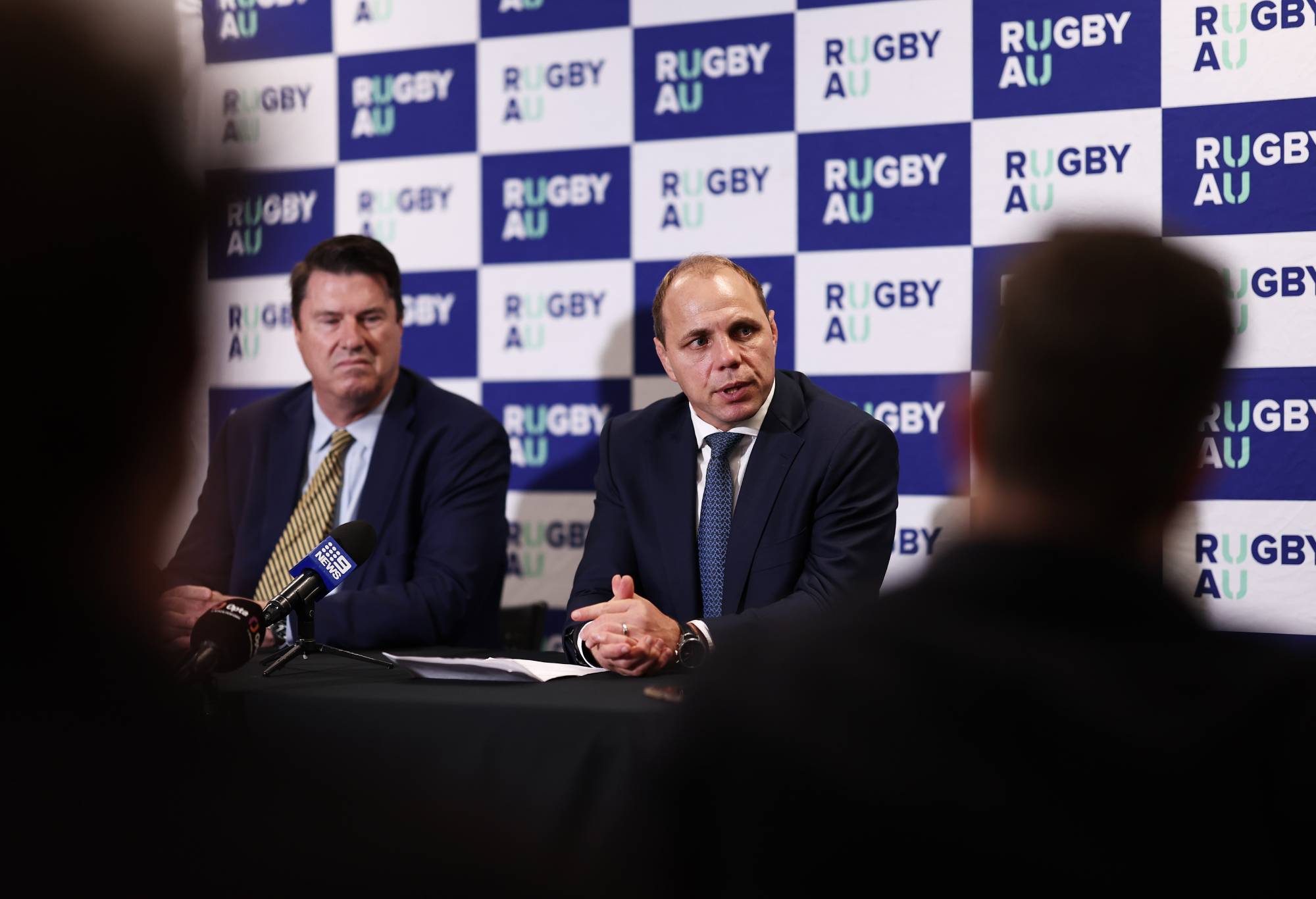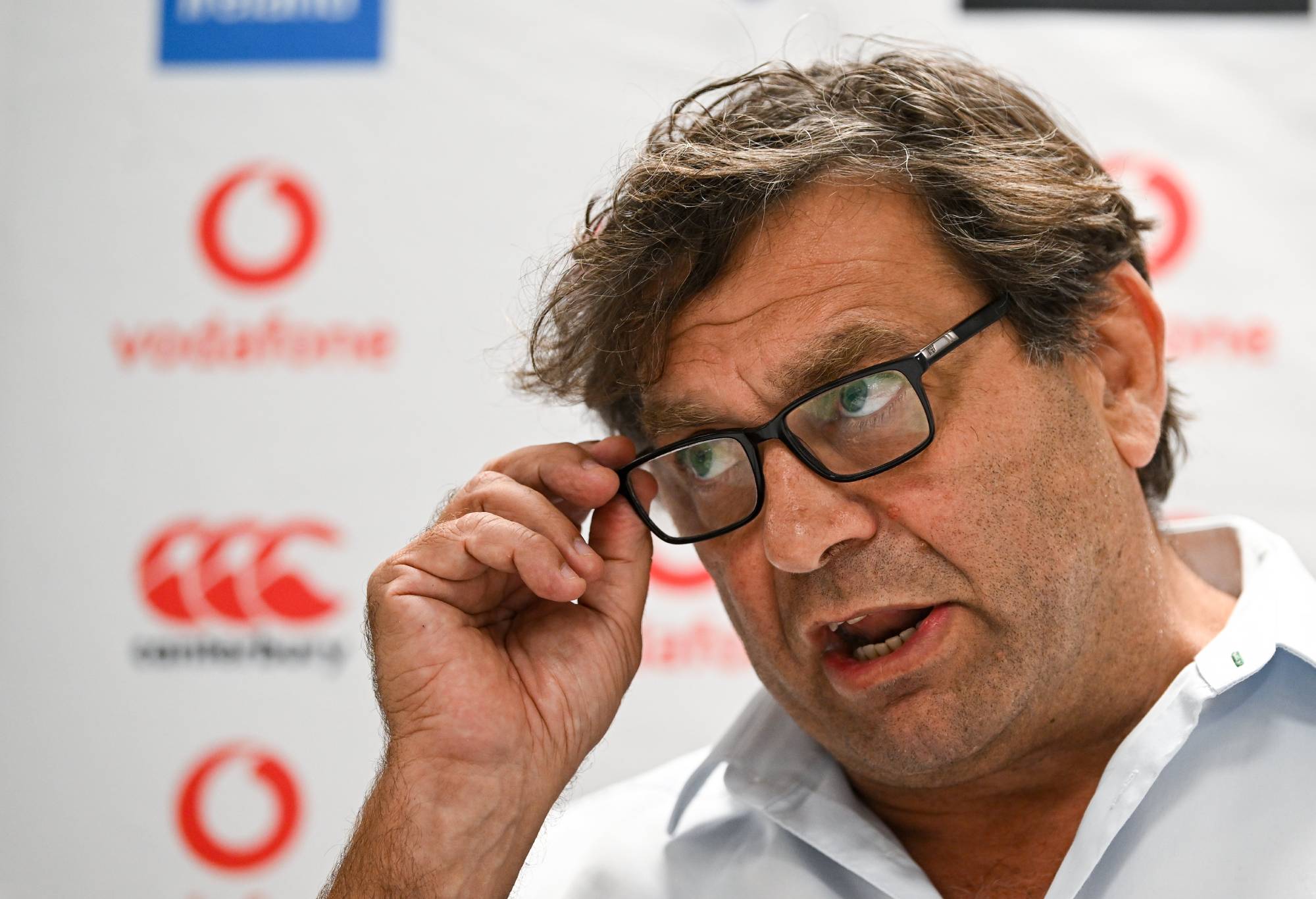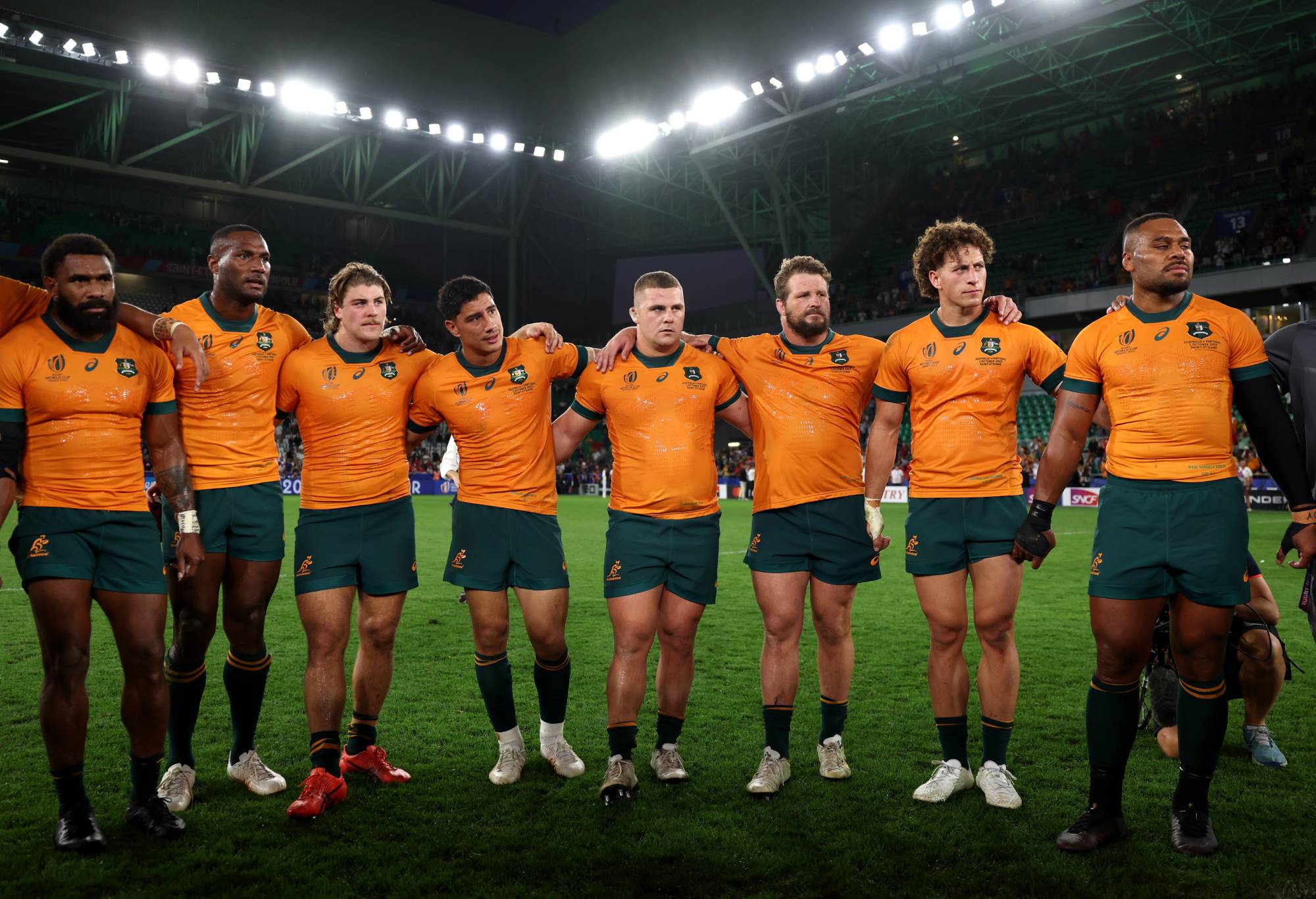
It’s 12 months since Phil Waugh took over as Rugby Australia chief executive and the dogged former Wallabies back-rower is still smiling on the eve of the first Test since Eddie Jones’ mischievous departure.
Perhaps through gritted teeth but nonetheless still smiling.
“It’s all under control,” he says, grabbing a bottle of sparkling water from his mini fridge inside Rugby Australia’s Moore Park office.
“I don’t have too much hair, but I’ve got as much as I had at the start.”

Rugby Australia CEO Phil Waugh is one year into the job. (Photo by Matt King/Getty Images for Rugby Australia)
Waugh has switched offices from the Bondi Beach end to the Anzac Parade side hoping for a breakthrough like Allan Border once tossed the ball to Shane Warne and instantly changed the feel of the Australian cricket side.
Understandably, too, given the fortunes of those that have come before him.
“[It’s] probably the longest tenure in CEO history in Australian rugby,” quipped two-time World Cup Wallaby Matt To’omua on The Roar Rugby podcast, having been told it’s one-year since Waugh started in the role.
“Remember how they used to ask following a crash who is the prime minister, but they stopped because we kept swapping,” To’omua added.
“I feel like we’re the same with Australian rugby, but, hey, good on him.”
To’omua’s not wrong, with Waugh stepping into the shoes of Andy Marinos, who stepped up after Rob Clarke temporarily held the fort in 2020 in the days after Raelene Castle lost the confidence of those around her – and the powerful brass of former Wallabies.
On being announced RA CEO, his once great ally Hamish McLennan declared that Waugh was fit for the job because he not only understood the Australian rugby landscape but had the business acumen to complement his rich rugby pedigree.
“We love the fact that he’s performed those dual roles and done it superbly, too,” said McLennan, five months before being ousted as RA chairman.
“I’d like to add that RA obviously has been through some very tough times since he joined the board in 2018 and as the chair of RA and working closely with Waughie, and I’ve known him for many years, he’s done an amazing job in terms of always being available and keeping the organisation afloat.
“There’s absolutely no learning curve for Waughie whatsoever, he’ll slip into the role.”

Rugby Australia CEO Phil Waugh (R) and Chairman Hamish McLennan. (Photo by Matt King/Getty Images for Rugby Australia)
Even still, 12 months on and Waugh, who has often said there are many ways to bring up a century and working singles is one of them, is coming to terms with the difficult nature of leading an organisation that has been through the ringer over the past decade.
“What’s surprised me?” he contemplates during an extended interview with The Roar. “It hasn’t surprised me, [but] the complexity of the environment.
“I’m reasonably positive as to how we’ve navigated our way through a difficult period, and then what we have in front of us.
“I haven’t actually been overly surprised about anything. I think I’ve been well prepared to come into the role and what the job has thrown at me thus far.
“We’ve had challenges that have been disappointing to overcome. But, unfortunately, because of the way the system has been structured and set up over time, we’ve got a lot of work to do to get it to an optimal position. But I do think we’re making good progress on that journey.”
The challenges that Waugh speaks of aren’t on a short list.
From Eddie Jones’ sly dealings with the Japanese Rugby Football Union, signing off a new $80 million loan to help keep Rugby Australia afloat, as well as the messy and unfortunate demise of the Melbourne Rebels after slipping into voluntary administration.
They are the high-profile, headline-grabbing stories Waugh has had to deal with.
But from having to assemble a new RA high performance team to appointing Joe Schmidt as Wallabies coach, trying to lower the overall salaries of players, as well as turning attention to a vital new broadcast deal that is on the horizon, Waugh has had to stare down the barrel of wars on every front.
No one before him, at least not in the last two decades, has come out alive with their stocks high.
Despite the public embarrassment of shrinking the game and retreating to four Super Rugby franchises, farewelling the sporting capital of Australia in the process by losing the Rebels’ men’s side, Waugh believes RA have been able to keep their eyes on the ball.
“I think we have been able to,” he says. “It’s been occupying a lot of time and the priority has been ensuring that players, management, staff are well looked after in a very disruptive environment, as well as the very important rugby fan base in Melbourne and those that support rugby.
“It’s been a very disruptive process. In saying that, I think the environment in Melbourne managed it reasonably well in terms of how they performed out on the field, how they held themselves, how we kept it together, all being funded by Rugby Australia.
“At the same time, we’ve got a Wallaby environment that there’s a complete reset with a new director of high performance, new head coach, new assistant coaches and essentially starting from scratch.
“I think that’s why having the experienced operators in that environment is important.
“Having a head coach that’s coached internationally for a decade and then him filling his assistant coaching positions with others that are highly experienced ensures that I’ve got a huge amount of confidence that we’re putting the right people in the right roles to set the system up for success.
“Whether that comes through immediately, we’ll see. But I think we’ve got the right people in the right roles.”

Former Rebels coach Kevin Foote hugs David Feliuai after the Super Rugby Pacific quarter-final defeat to the Hurricanes at Sky Stadium, on June 08, 2024. (Photo by Hagen Hopkins/Getty Images)
One of those people is outgoing Irish performance director David Nucifora, who late last year was confirmed as a consultant for RA a decade after leaving his post with Australian rugby.
Although the former Wallaby has been fixated on leading the Irish men’s and women’s programs to gold in Paris, Nucifora has been working behind the scenes with Waugh.
It comes after a 24-month battle with trying to draw up a new contracting model, with the governing body privately concerned about skyrocketing player salaries.
“I think we need it,” Waugh says. “I don’t think the contracting model that we have in place is ideal.
“So [I’ve been] working with Peter Horne and David Nucifora on that.
“As you know, there’s exclusions in the salary cap. There’s a whole lot of different ways to fit within the salary cap, which may not actually be prudent across the system.
“It’s not about copying systems, but I think that with David Nucifora’s success in Ireland, and the way that they’re able to retain talent and develop talent, it’s a good system to get some counsel from.”
Nucifora’s hard-line approach with experience with placing players at the four Irish provinces will likely have been tapped into as the fallout of where homeless Rebels players find new homes.

Outgoing Irish Rugby Football Union High Performance Director David Nucifora has already been working weekly with Rugby Australia. (Photo By David Fitzgerald/Sportsfile via Getty Images)
But it’s not as easy as simply directing contracted players where RA wants either, especially with the finer details of who is paying for what – the governing body wants the remaining four Super Rugby sides to pay half the fee – is yet to be ironed out.
“Clearly, we’ve got cost pressure across rugby as a system,” Waugh admits.
“So ensuring that we look after players, get the appropriate players in the right environment for their success as well as the overall system’s success. And then working with the Super Rugby Clubs around affordability.
“There’s five guiding principles as to how we’re placing players to ensure that players end up in the right environment for their success and the overall system’s success.”
They are: teams in gold; player choice; depth in system; needs of Super Rugby clubs; and financial affordability.
But there’s also now an acceptance that not everyone is going to be kept.
“It’s the nature of professional sport that you can’t keep every player that you’d like to keep,” Waugh said.
“We’ll make considered, disciplined decisions around prioritisation of players.
“And it’s not saying that we’re not going to pay players what they’re worth, because I think we need to pay players what they’re worth.
“I think it’s around making the right prioritised decisions on who and which players that we will prioritise.
“There’s no doubt that we’ve got an opportunity to optimise the environment across now our four Super Rugby clubs and ensure that the focus is on winning teams in gold.”
Waugh’s also been working away trying to bring the big end of business back to rugby.
As revealed by The Weekend Australian, some of the nation’s biggest and best fund managers have been working to raise $100m to help save the game from going under.
A group of 15 stock pickers and rugby lovers have been trying to raise funds in recent months, promising to contribute their time and investment for free.
The Rugby Future Fund is targeting a $100m capital raising exercise, with 1 per cent of its gross assets per year to be donated to the Australian Rugby Foundation.
The fund is being led through by ARF director Ben Scott as well as RA director Matthew Hanning, who have also brought on Brian O’Sullivan to lead the future fund.
“It’ll be one of our funding initiatives,” Waugh says. “We’ve got others in the pipeline.”
Can it be a game-changer?
“It’ll be a contributor,” he says.” I don’t think it’s going to be a game-changer on its own but I do think it’s going to be a strong contribution.”

New Wallabies coach Joe Schmidt speaks to media. (Photo by Mark Metcalfe/Getty Images for Rugby Australia)
What does loom as a defining moment in the game is RA’s next broadcast deal, which will start in 2026.
Having settled for a $32m per-year deal with Nine Entertainment and Stan in 2020 – a reduction from US$50m from News Corp and Fox Sports during the previous five-year-deal – after Castle attempted to create competitive tension, RA is in desperate need of an uplift to be able to service all its arms across the Australian rugby landscape, including a greater expenditure on the Wallaroos program.
Nine Entertainment have exclusivity until the end of the year to deal with RA, but it all likelihood the governing body will try to create the competitive tension that was winning in 2020.
“I think right now we’ve got to see the conversations around the Nations Cup, and also just ensuring that we’ve got the right understanding of what 2026-2030 looks like in terms of the calendar, which we are well progressed in,” Waugh said.
“So that within the package, Nine have a good understanding of what they’re bidding for.”
So is competitive tension necessary?
“I think if you create the product that’s attractive, you’re going to have people who want it,” Waugh said.
“My job is to create a product that’s appealing to consumers and sports lovers, and I think we’re on that journey.
“We’ve got a fair way to go, but I do think we’re on the right journey to create value in what we’re producing.”

Phil Waugh wants the Wallabies to get back to winning every Test match. (Photo by Chris Hyde/Getty Images)
While the Lions series and home men’s (2027) and women’s (2029) World Cups are the showpiece events on the Australian rugby calendar over the next five years, Waugh says it’s essential that Australia’s teams get back to winning now.
“I’ve always said that winning between World Cups is more important than winning a World Cup, and I still believe that,” said Waugh.
“You want to win your next Test because that builds momentum. “Winning’s a habit, losing’s a habit, so the more you win, the more it becomes a habit.
“Right now the Lions is a priority and Joe’s setting up an environment whereby we build the right depth and the right combinations and the right cohesion across the squad to peak at the Lions.
“Ireland have done well in between World Cups, and [whilst] they’ve never gone through to a semi-final, they’ve built a system that consistently wins, consistently engages with the community and the fans and so, therefore, your value and sustainability of the game becomes far more evident, and so that’s why it’s really important to win between World Cups.”
That starts on Saturday night, with the Wallabies hosting Wales at Waugh’s former home ground.
Will he be able to switch off and get a good night’s sleep before it?
“Not really, not really at the moment,” says Waugh, before needing to rush into a 9am meeting.
“It’s all consuming, but I do feel like we’re making really material progress.
“Hopefully it feels like that from the outside, or looks like that from the outside, where it actually feels like we’re making good progress.
“It’s going to be a journey.
“We’re going to need the whole system to come along on that journey. It’s not like Rugby Australia is going to be able to dictate it, but I do think we’re making considered decisions to put the game in the best possible place.”
Christy Doranhttps://https://ift.tt/CqokBhj Waugh’s year of living dangerously – and why he thinks RA is back on track after 12 months of massive calls
إرسال تعليق